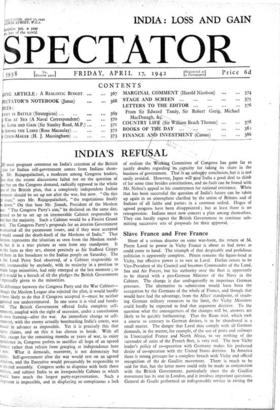Slave France and Free France
Short of a serious disaster on some war-front, the return of M. Pierre Laval to power in Vichy France is about as bad news as could come to hand. The triumph of that despicable and perfidious politician is apparently complete. Petain remains the figure-head at Vichy, but effective power is to vest in Laval. Darlan ceases to be Vice-President of the Council and becomes Commander of the Land, Sea and Air Forces, but his authority over the fleet is apparently to be shared with a pro-German Minister of the Navy in the Cabinet. The change is due undisguisedly to imperious German pressure. The alternative to submission would have been the occupation by the Germans of the whole of France, and though that would have had the advantage, from the Allies' standpoint, of strain- ing German military resources to the limit, the Vichy Ministers could hardly be expected to find that argument decisive. To the question what the consequences of the changes will be, answers are likely to be quickly forthcoming. That the Riom trial, which took a course so contrary to German desires, is to be abandoned is a small matter. The danger that Laval may comply with all German demands, in the matter, for example, of the use of ports and railways in Unoccupied France and North Africa, to say nothing of the surrender of units of the French fleet, is very real. The new Vichy leader's policy of co-operation with Germany makes his professed desire of co-operation with the United States derisive. In America there is strong pressure for a complete breach with Vichy and official recognition of the de Gaullist movement. There is much to be said for that, but the latter move could only be made in conjunction with the British Government, particularly since the de Gaullist movement has its seat in London, and it involves important questions. General de Gaulle performed an indispensable service in raising the standard of Free France when the old France fell in 1940, and his personality has been an invaluable rallying-point. But if there is to be recognition of the de Gaullist movement, the movement must be duly organised, and as impressively as possible. No single indi- vidual can be so recognised, only a properly constituted and con- tinuing organisation. This concerns all Free Frenchmen in Britain, whatever their personal preconceptions, and it is a matter of considerable urgency.



























